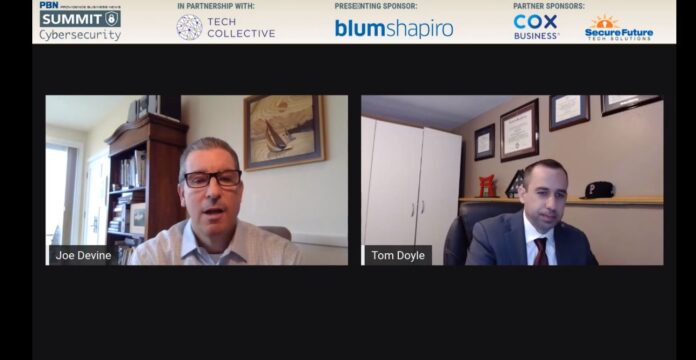
PROVIDENCE – International cybercriminals have leapt on vulnerabilities aggravated by the pandemic to supercharge their ransomware, phishing and other attacks, raising the frequency of these incidents in the Boston area alone by 94% from the first half of 2020 compared with same period in 2019.
The equivalent figure for Rhode Island was 81%, said Tom Doyle, cyber intelligence analyst from the FBI’s Boston field office, who was keynote speaker at the Cybersecurity Summit hosted virtually on Wednesday by Providence Business News in partnership with the Tech Collective.
Doyle painted a grim picture of the greater frequency and sophistication of these attacks while, at the same time, encouraging affected businesses to reach out to the Boston FBI office, which, is building ever-greater expertise in understanding and fighting cybercrime, he said.
During one of the summit’s three breakout sessions, Jeffrey Ziplow, a partner at Blum, Shapiro & Co. P.C., offered some explanation why the COVID-19 pandemic has encouraged cybercrime, which had been growing even before 2020.
Workers staying at home, in effect, vastly expanded the boundaries of offices’ computer systems, Ziplow said. It has thrown employees into home offices, where security might be weak for all kinds of reasons, from WiFi with old passwords to people, overworked and distracted, with family members who may be on home computers for many reasons, including surfing the internet looking for information on COVID-19 and the presidential elections.
Also, federal money distributed in the spring for various types of pandemic relief have released a temporary flood of money into the public and at businesses, an opportunity that cybercriminals – many working from remote places, including Russia – are eagerly grabbing with ever more refined techniques.
Ziplow was part of the panel is a session that accessed a recent cyber incident and provided insights and best practices for businesses to reduce damage and recover. The other panelists were Cindy Lepore, vice president of Marsh & McLennan Agency LLC., and Linn F. Freedman, chair of data privacy and cybersecurity team at Robinson & Cole LLP.
Another breakout session took a closer look at Tech Collective’s “Rhode to Resilience” security program for small businesses. Eric M. Shorr, president of Secure Future Tech Solutions, and Douglas Tondreau, from the Digital Forensics Center at the University of Rhode Island, were on the panels.
A third session examined technical methods for control the spread of ransomware. On that panel were David Sun, digital forensics and security partner at Blum, Shapiro & Co., and O’Shea Bowens, founder and CEO of Null Hat Security.
Kim Casci Palangio, assistant vice president of victim services for the Cybercrime Support Network, gave the closing remarks.
Doyle, the keynote speaker, presented the FBI’s Boston office as a helpful resource for Rhode Island businesspeople at the time of an attack, and also earlier, through various FBI resources providing education and warnings.
A major topic of discussion during the summit was ransomware, used by criminals enter a company’s computer system and lock up, or encrypts, its data. The criminals then demand a ransom to reopen access. In the past year or so, criminals have doubled down on ransomware, adding a second layer, in which they threaten to move sensitive data onto the internet, including the dark web, if the victim company fails to pay.
Doyle said ransomware attacks have increased by 250% in the Boston area in the fiscal year ending September 2020, with some victims paying more than $1 million to retrieve and protect their data. He believes the FBI learns of only a fraction of the number of actual attacks because most go unreported. New England holds special interest among cybercriminals – a group that includes independent criminals and also operatives working for governments – partly because of its wealth of research and medical facilities.
FBI Boston Office and national resources for cybersecurity information and help:
Boston FBI office by phone – (857) 386-2000
Internet Crime Complain Center – www.ic3.gov
Cyber Task Force (at all 56 local FBI field offices) – www.fbi.gov/contact-us/field
CyWatch 24/7 Operation – cywatch@ic.fbi.gov and by phone at (855) 292-3937
Information on current threats – www.infragard.org
Department of Homeland Security Cybersecurity & Infrastructure Security Agency – www.us-cert.gov/ncas/alerts











